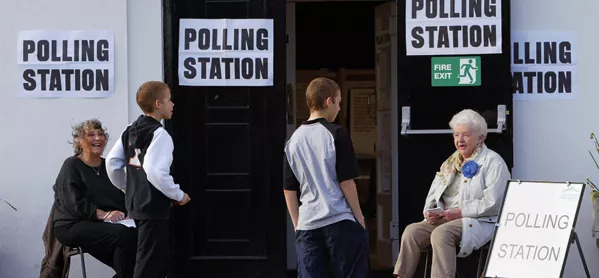We have all become immune to schools being asked to solve society’s ills. Terrorism? Introduce Prevent in schools to detect and defeat extremist tendencies. Obesity? Cyberbullying? Child sexual exploitation? The list is seemingly endless: you name it, the schools will fix it. Sorry, but I am about to add to the list. It’s politics you need to help us mend next. Consider.
Most of those reading this column will cast a vote on 8 June even if, on this occasion, there’s a touch of world-weary cynicism about the parlous state of our body politic. No, with a heavy heart, we’ll do our duty - in my case pointlessly, as I live three houses the wrong side of a border that separates a vulnerable Labour seat from my constituency, which has returned a Conservative since Gladstonian times.
There, I’ve revealed my party sympathies - which, as a teacher who later worked in local government, I was brought up never to do. From the 1970s there was a definition of “politically sensitive posts” which precluded the holders, including me, from engaging in party political activity. A bit like a monk’s vow of celibacy.
It was, and still is, much the same for teachers. We encouraged - schools still do - mock polls at the time of a general election, but party politics is prohibited territory for teachers, full of minefields.
I now think political abstinence by schools is a mistake that is undermining our society by creating a knowledge deficit and contributing to a sense of powerlessness among school leavers, which is the enemy of democracy itself.
Political illiteracy
Talking to friends of my teenage grandchildren, I am struck by what might be called their political illiteracy. It’s not just their alarming lack of knowledge of all but a few politicians: they don’t seem to know what an MP is or does, much less the distinction between central and local government powers. They are all at college or sixth-form or on apprenticeships - all in the generation swept up by the raising of the age of those in education to 18.
Their lack of knowledge, skill and judgement in political matters is more serious for their and our future than wrestling (often unsuccessfully) with equations or fronted adverbials.
What I am suggesting, therefore, is that part of the post-16 curriculum in schools and colleges should be a requirement that at national and local election times, all the political parties produce a manifesto summary aimed at 16 to 18-year-olds. The parties should be required to back their manifesto promises and proposed policies with evidence.
The prescribed format might require each party to set out how voting for them would impact on the present and future economic, physical, mental, and spiritual wellbeing of children, young people, employed and unemployed working-age people, disadvantaged and minority groups, pensioners, the environment and people in other countries.
Teachers should be encouraged to join in the hustings, where the party representatives would set out their stall. Such one-off election hustings and manifestos might be complemented by annual debates on key political issues of the moment.
After the turbulent last 12 months of the Brexit referendum, Trump and digitally-enabled “fake news” and “alternative facts”, in education we can no longer hide modestly behind the skirts of political celibacy. If politicians are assuming they can decide what we teach and how we teach it, we surely have a duty to help our young people - who at 16 can join the armed forces - to be better equipped and committed to vote and make political choices when they are 18.
Sir Tim Brighouse is a former schools commissioner for London





